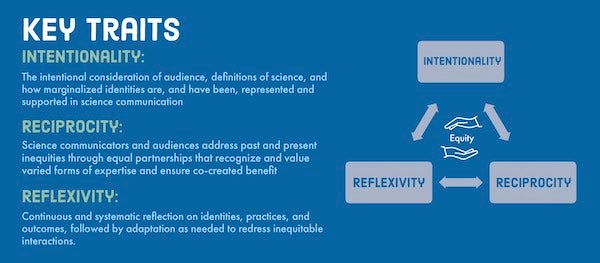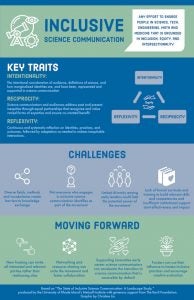
Metcalf Institute just released an important report about the state of inclusive science communication (ISC). The study, funded by The Kavli Foundation and the Burroughs Wellcome Fund, is the first to broadly investigate what drives leaders in inclusive science communication and to identify challenges and opportunities for the emerging ISC movement.
The report offers ideas for individuals, organizations and institutions about how to shift from the traditional paradigm of science communication toward a new approach grounded in inclusion, equity, and intersectionality.
Download the report here and visit inclusivescicomm.org to see other related inclusive science communication resources.

The study, conducted by Dr. Kaytee Canfield and Metcalf Institute Executive Director Dr. Sunshine Menezes, is based on interviews and focus groups with ISC leaders whose work spans a wide range of career stages, disciplines, sectors, methods, and settings. The report is intended to provide foundational insights for the ISC movement that can be used by multiple audiences: students and professionals, researchers and practitioners (and the growing number of people who operate as both researchers and practitioners), individuals and organizations.

Study participants agreed that science communication is not inherently inclusive or equitable, and they called for a transition to approaches that are “accessible by default” across all types of science communication, from journalism to museum exhibit design to social media to after school programs.
The report identifies three key traits of inclusive science communication and offers examples of how these traits are being applied in different settings. It takes an in-depth look at major challenges facing the inclusive science communication movement, including limited curricula and training to build ISC competencies, the professional and financial risk for early-career researchers attempting to pursue ISC careers, and the fact that many scholars and practitioners are working in silos that duplicate effort and limit broader impacts.
The report also provides a roadmap for the future of ISC by offering ten recommendations, such as the need to expand opportunities for multilingual engagement, recruit and support diverse leadership, and create new networks to build community and seed new approaches.
